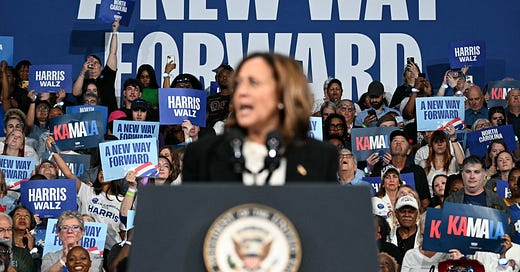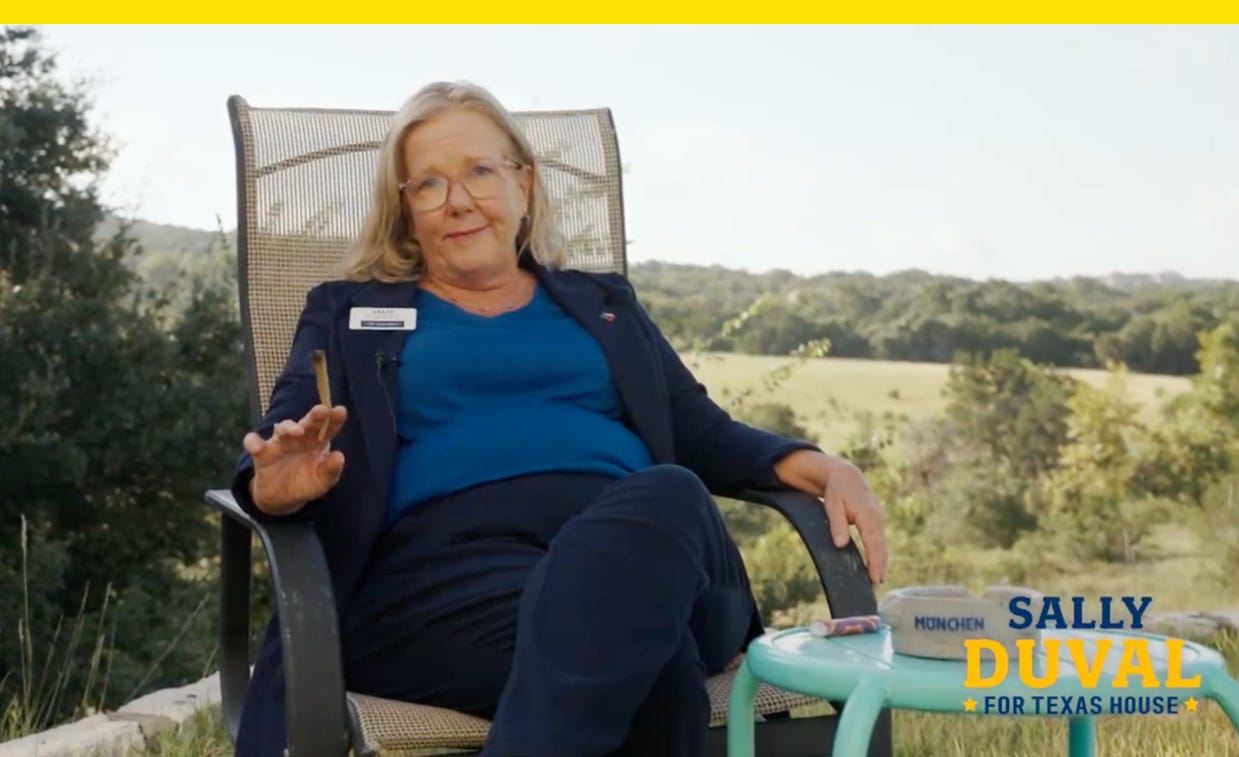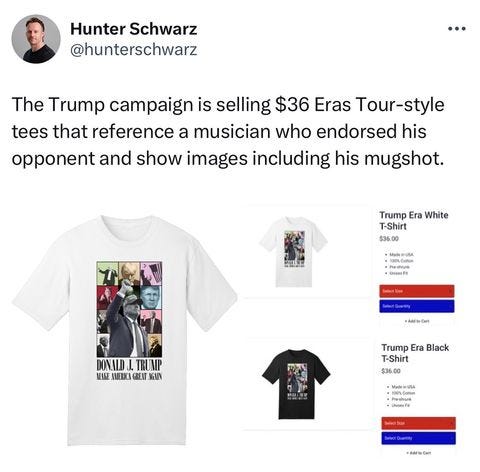The advantage of the Harris campaign’s typography-first branding
Plus: This Texas House candidate lights up in ad about marijuana legislation
Hello, in this issue we’ll look at…
The advantage of the Harris campaign’s typography-first branding
This Texas House candidate lights up in ad about marijuana legislation
Scroll to the end to see: the windows that just went up at the Obama Presidential Center 🪟
The advantage of the Harris campaign’s typography-first branding
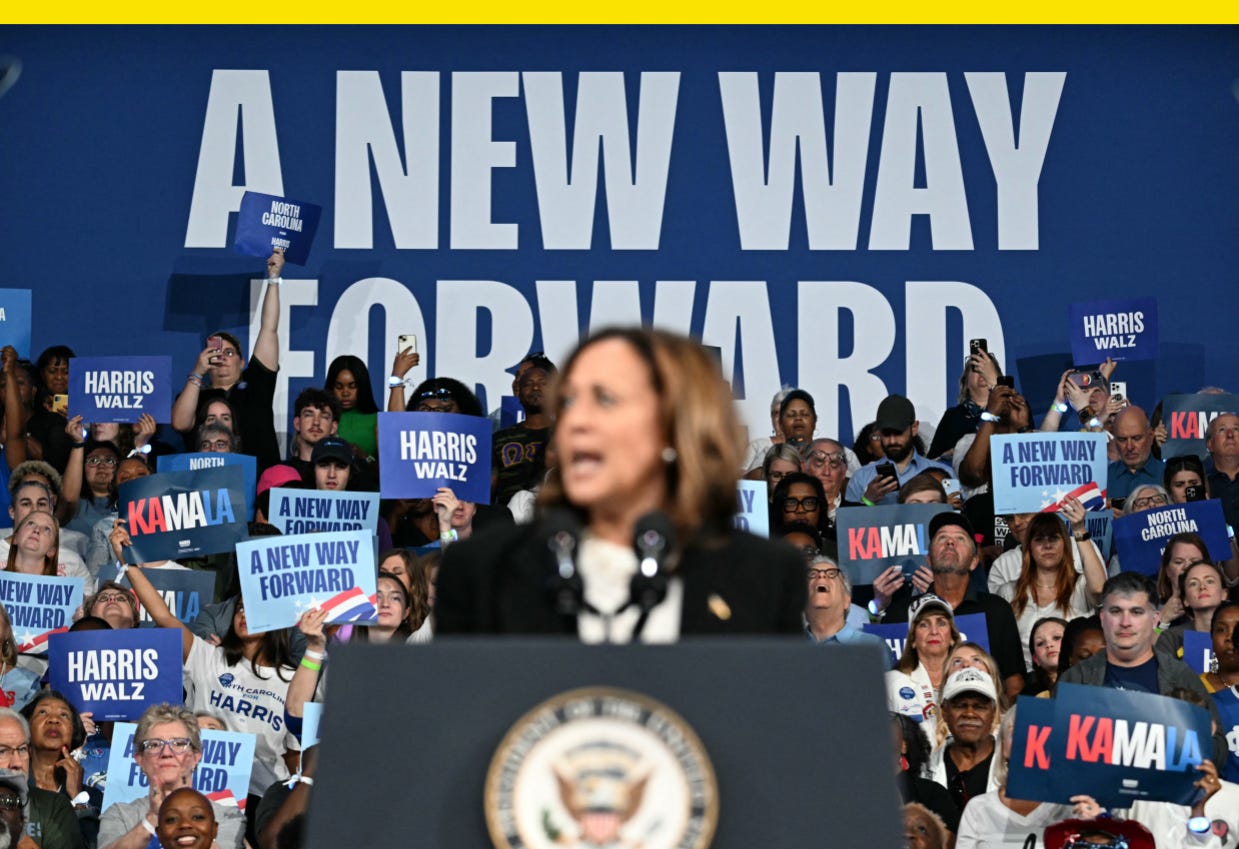
When Vice President Kamala Harris’ campaign unveiled a new logo after naming Minnesota Gov. Tim Walz her running mate last month, she broke from a dozen years of Democratic design tradition. Rather than a logo that turned a single letter into an iconic design element, like the Obama O, the Hillary H, or the Biden bacon, the Harris-Walz logo is just a wordmark.
Panned by some at first as boring, it’s the foundation of a larger type-based brand that’s still rolling out and it has a specific advantage in 2024. If there are four things generative artificial intelligence is still bad at replicating, it’s fingers, teeth, Kamala Harris, and type. That means a Harris campaign brand centered on typography is harder to fake with A.I.
Former President Donald Trump falsely claimed A.I. was used to make Harris’ crowd size appear larger at a rally in Detroit, and at the debate he said “people don't go to her rallies” and accused her of busing supporters in. If you have any questions about the veracity of Harris campaign rally crowds, you can count yourself (the New York Times did), and if you doubt photos of her rallies, you can always check the fingers and lettering. When it comes to early-stage A.I. deepfakes, spotting typography errors has become a form of visual fact-checking, a clue to help confirm the veracity of an image.
Trump is diving even deeper into A.I. chum. There’s a cheapness to the images that A.I. produces, but Trump’s nevertheless embraced it as a social media content strategy, posting things like faked images of Taylor Swift fans supporting his campaign. He’s since pivoted to posting images of pets, like a cat with a sign that reads “Kamala Hates Me.” It’s a bizarre callback to his debunked comments during the debate about Haitian immigrants in Ohio eating pets, a baseless rumor the Arizona Republican Party also referenced in a billboard that reads, “Eat Less Kittens, Vote Republican.”
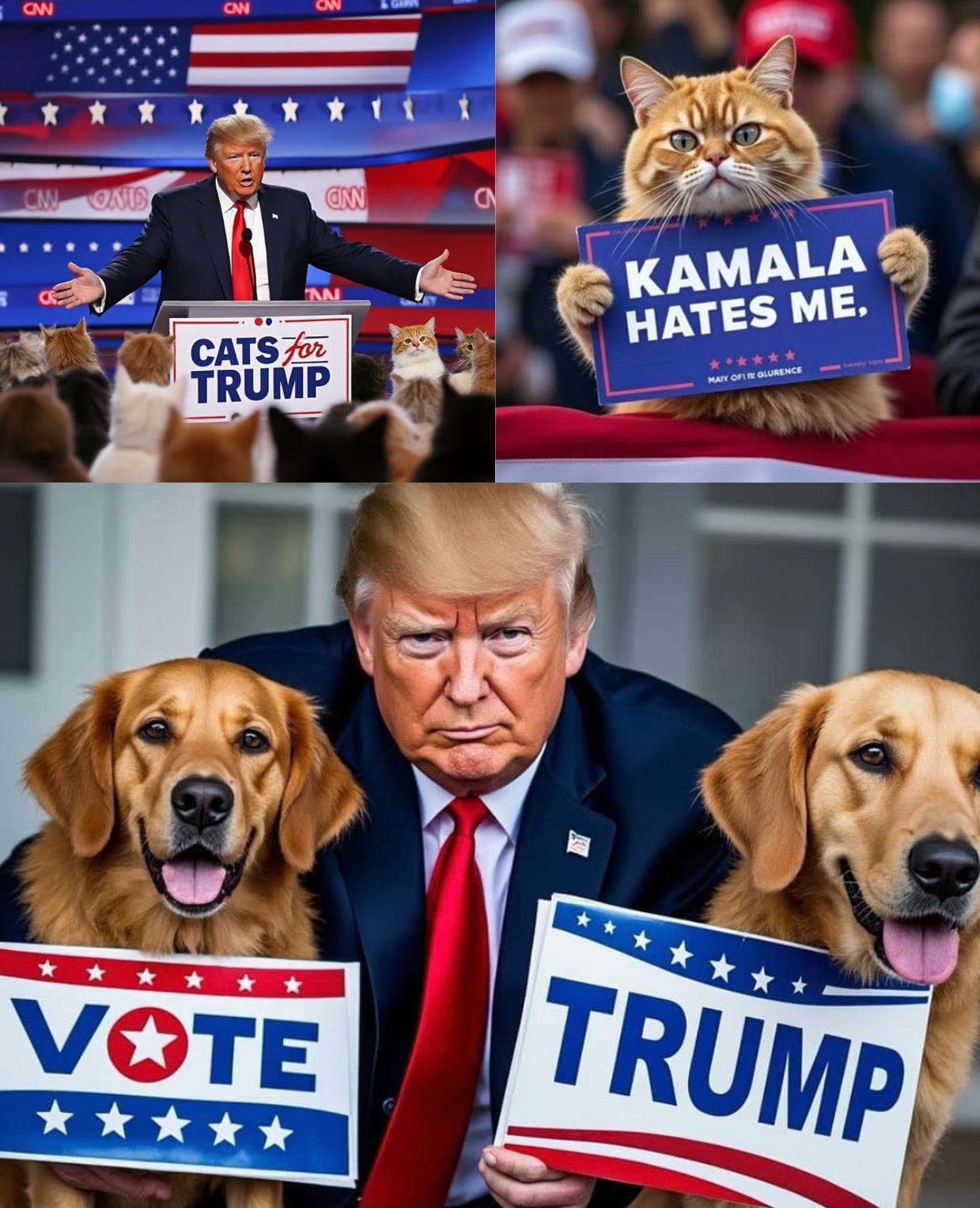
As Late Show host Stephen Colbert asked, “Why are you seizing on Trump’s most embarrassing moment of the debate?… after Biden’s debate, you didn’t see billboards saying, “I don’t where I am. Vote Democratic.’” And yet Trump persists.
In an A.I.-generated image Trump shared speaking to a “Cats for Trump” rally, the CNN logo in the background is jumbled in places, while the aforementioned image of a cat holding the “Kamala Hates Me” sign shows gobbledygook written alongside the bottom side. Interestingly, none of the images are labeled A.I. on Meta’s Instagram.
In pushing A.I. content, especially content related a debunked conspiracy theory, Trump is cheapening his brand. And it only draws an unflattering contrast between himself and his opponent. While Trump posts A.I. pics with pets to play on a conspiracy theory, Harris’ accounts share real photos taken of real campaign events. The tall, clear lettering in the background shows the photo was shot by a human, not made by a computer.
This Texas House candidate lights up in ad about marijuana legislation
It’s high time for change in Texas.
That’s the name of a campaign ad from Sally Duval, a businesswoman and Democrat running to unseat an incumbent Republican in a solidly Republican Texas state House district outside San Antonio. Duval lists legalizing marijuana as the first issue on her campaign website’s issue page, and her ad emphasizes her views.
“You might already know what’s in this,” Duval says after lighting a joint and smoking it. “But do you know has no idea and no way to test it? Law enforcement. They arrest people everyday for marijuana possession but they don’t have the funding to test if it’s illegal marijuana or a federally legal hemp product.”
Duval says Texas laws are confusing and she calls for legalization, which she argues will help farmers and generate tax revenue to fund education and public and mental health services. At the end of the ad she smokes from a bong and coughs.
Although 57% of U.S. adults support legalizing marijuana for medical and recreation use, according to Pew Research Center, views vary by party. Just 42% of Republicans and Republican leaners support fully legalizing marijuana compared to 72% of Democrats and Democratic leaners.
Trump is among his party’s pro-legalization minority, saying he’ll vote in favor of a ballot measure that would allow its recreational use in his home state of Florida. Harris also supports legalization, though she previously opposed it when running for California attorney general in 2010 and 2014.
A U.S. Senate candidate in Louisiana smoked marijuana in his campaign ad in 2022. Democrat Gary Chambers Jr., lit a joint and spoke in his ad about how someone is arrested for possession of marijuana every 37 seconds. While support for legalizing marijuana has grown in recent years, it wasn’t a winning issue for Chambers. Incumbent Sen. John Kennedy (R-La.) beat him with about 61% of the vote.
Have you seen this?
Artist Julie Mehretu installs colossal painted glass window at Obama Presidential Center in Chicago. The 83-foot-tall glass artwork is titled “Uprising of the Sun.” It consists of 35 colorful abstract glass panels and is now part of the center’s public art display. [Designboom]
Antisemitic ads about Doug Emhoff target Muslim voters in Michigan. According to the Google Ads Transparency Center, a group called Future Coalition PAC has run six advertisements since Sept. 5, three of which deal explicitly with Mr. Emhoff’s faith. Others focus squarely on Ms. Harris’s support of Israel. The ads target Michigan residents — including those in Detroit-area ZIP codes that are home to many Muslim Americans and Arab Americans. [New York Times]
This genius website captures Trump’s weirdest debate quotes. The Weird Button is a new microsite created by the grassroots collective Creatives for Harris. It currently displays a selection of 22 egregious and nonsensical instances of Trump-speak, sourced from news headlines, YouTube videos, and C-SPAN transcripts. [Fast Company]
🔒 How the presidential debate stage played to Harris’ strengths. The fact that ABC News developed an understated set that evoked civic symbols, like the Commission on Presidential Debates had in the past, suggests the network was aiming to similarly create a set that looked staid and nonpartisan, dialing down the bravado in favor of a considered contest. [Yello]
History of political design
Trump Era tee (2024). Trump’s campaign reimagined Taylor Swift’s shirt design for a shirt of its own, and online, Democratic Swift supporters are tagging the pop star’s publicist Tree Paine and asking her to “do your thing.”
Like what you see? Subscribe for more:
Politics in the front, pop culture in the back.
Subscribe to my new newsletter Whig:

